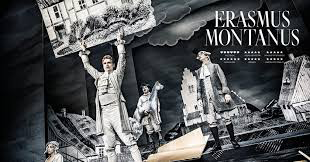Erasmus Montanus Eller Jorden Er Flad
« Erasmus Montanus » est une pièce de Holberg (1684-1754), le « Molière » de la Baltique. Il était enfant du théâtre italien, il devint le père du théâtre russe et scandinave. Aujourd’hui, le théâtre ancien est bien maltraité. Ou bien on le joue dans un registre « naturaliste-guindé », ou bien on le fait « éclater » pour le « signifier » (dans le cadre de la dernière mode intellectuelle) et cela, c’est exactement ce qu’aurait fait notre Erasmus s’il avait fait du théâtre. Mais ici, c’est le théâtre (donc le film) qui s’empare d’Erasmus, digne membre de cette « tribu instruite » qui toujours s’arroge le droit de se couper de la réalité ; et l’idée de Henrik Stangerup quand il s’empare d’« Erasmus », c’est justement de rendre la pièce à sa réalité. Pour ce faire, il l’enlève à ses terres natales pour lui faire courir ailleurs (au Brésil) le risque (donc la chance) d’un métissage qui lui rendrait son sens et son sang premier. Des corps souples, des voix neuves et des esprits sincères ont ainsi envahi l’architecture de Holberg avec une fougue de « Commedia dell’arte ». Et après ce long détour qui le ramène à lui-même, voici Holberg retrouvé, voici que le Brésil réel rend l’intellectuel à son exotisme, et nous voici ravis de cette fable sur la rondeur des choses et la platitude des théoriciens. Michel DELAHAYE
Artistic & technical sheet
Fabio Camargo
Fausto Wolff
Gloria Cristall
Lucia Mello
Paulo Fortes
Wilson Grey
Scénario
Fausto Wolff, Henrik Stangerup d'après la pièce de Ludvig Holberg
Montage
Hilde Lochen Trier
Musique
Jurij Moskvitin
Décors
Erik Bottzauw
Production : Henrik Stangerup, Thorkid Kristensen, Stig Bjorkman
